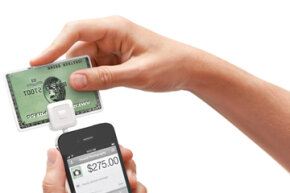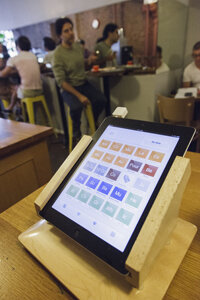- Joined
- Nov 26, 2020
- Messages
- 714

Square can turn your smartphone into a credit card machine.
Cash is the 20th century. Consumers are attached to the convenience of plastic. Have you ever used your credit or debit card to pay for a pack of gum? You are not alone. In 2012, US shoppers only used cash to pay for 27 percent of retail transactions. The vast majority of transactions were paid using credit cards (29 percent) or debit cards (31 percent). But even credit cards are starting to seem old-fashioned. More and more consumers are leaving their wallets at home and shopping exclusively from their smartphones.
Squareis a popular service that allows you to buy, sell and send money from any Apple or Android mobile device. With three free mobile apps - Square Register, Square Wallet and Square Cash - Square is dedicated to helping small businesses accept credit card payments and helping consumers move towards a cashless and non-cash lifestyle.
Square is one of several leading players in the emerging world of mobile payments. According to research firm Gartner, in 2012, more than 200 million people worldwide made payments from their smartphones, swiping from their device through a special reader or making direct payments using services such as Square Wallet or PayPal. This number is expected to grow to 384 million by 2015. IE Market Research predicts that the mobile payments industry will have total revenue of $ 998 billion by 2016.
If you're ready to join the wallet-free revolution, keep reading to find out how Square can turn your smartphone or tablet into a portable cash register and how you can send up to $ 2,500 to a friend using just email.
Selling with Square

This coffee shop in New York uses Square for payments.
One of Square's biggest strengths is the ability for small businesses to accept credit card payments. A great example is a vendor at a farmers' market. In the past, shoppers had to use cash to purchase organic kale and gooseberry jam at the farmers' market. With a service like Square, a farmer's market seller can turn their smartphone into a fully functioning cash register that accepts credit or debit card payments and deposits directly into a bank account.
The first step is to download the Square Register app for your iPhone, iPad or Android device through the iTunes App Store or Google Play... Then you need to register with Square Register on the Square website. Once you sign up, Square will send you a free card reader, a small device that plugs into your smartphone's headphone jack. You can also buy card readers from pharmacies like Walgreen and Rite Aid and get credit for their value for later use with Square.
Next, you need to enter your bank account information into the app so that credit card payments can be transferred to your account. Square says most payments are credited within one to two business days.
However, the service is not free. Square charges a fee of 2.75 percent on each transaction carried out, or a flat monthly fee of $ 275. If you are a farmers market seller who uses Square Register for relatively few transactions, then the interest rate is the best deal. But if you are a large retail store that processes a lot of credit card transactions, a flat monthly rate is the best option. Note that Square charges more for manually entered credit card numbers - 3.5 percent plus 15 cents per transaction. Even if you choose the flat monthly rate of $ 275, there is an additional charge for so-called data-entry transactions.
Square Register is more than a convenient payment service. The free app works just like a real point of sale in a restaurant or clothing store, except that these items cost thousands of dollars. The app allows you to create records of everything you sell with photos and prices. To make a sale, simply click on the items you want to buy. The app will even add related taxes and gratuities.
To process the payment, swipe the card through the reader or enter the account number manually (some online browsers complain that the card reader is unreliable). You can even send receipts by text message or email.
To increase profits and grow your business, the Square Register app offers built-in sales reports and analytics to track your top-selling products and offer rewards to loyal customers.
We will now look at ways to use Square as a virtual wallet.
Square payment
Square is more than just a mobile checkout. It also offers free apps for making payments from your smartphone and sending money to friends via email.
Square Wallet is a free app that lets you check out hundreds of thousands of stores and restaurants with just your smartphone.
After downloading the Square Wallet app from the iTunes App Store or Google Play, you'll be asked to enter your credit card information and upload your photo. Why do you need a headshot to buy a sweater? You will see in a second.
Using the GPS built into your smartphone, the Square Wallet app allows you to browse or search for local businesses that accept Square Wallet payments. When you physically enter a store, you click its name in the Square Wallet app. This is called “registering” at the store. When it's time to pay for a sweater, you don't even need to take out your phone. Just tell the seller your name and he will see your beautiful photo on his screen. By clicking on the picture, the sweater will be debited from your credit card.
If you regularly visit a store or restaurant, you can use the special registration function and order your favorite items automatically.
Square's free service to send money to friends and family is called Square Cash... You don't need a Square device to use it - just an email address and debit card. Let's say you want to give your niece $ 50 for her birthday, but she lives in another state. You can mail her a check or use Square Cash. This is how it works:
- Write an email with your niece as the recipient
- Enter your email address [email protected] in the Cc field.
- Write "$ 50" in the subject line.
- Compose your birthday greetings and click send.
- Square will email you a link to enter your debit card number.
- Your niece will receive two emails: an email from you and a second message with a link to enter her debit card information.
- The money will be credited to her bank account within one to two days.
As with any new technology, Square has its detractors. Keep reading to find out about some of the common complaints about Square's services and how the company is responding.
Square's competitors
The mobile payment field is overcrowded. Here are some of Square's toughest competitors:
- Intuit GoPayment : Another Credit Card Reader for Smartphones
- Google Wallet : Allows you to pay at the checkout with a tap of your phone.
- PayPal : Offers both a mobile card reader and the option to pay with a mobile phone number.
- Venmo : Send money to friends with this free mobile app
Criticism of Square

Jack Dorsey, creator of Twitter and founder of Square, holds up a Square device while speaking at the TechCrunch Disrupt conference in New York in 2010.
Jack Dorsey, founder and CEO of Square, is a self-proclaimed minimalist. Dorsey's first success story was Twitter, which he co-founded in 2006. Part of Twitter's charm is its simple design and creative restraint - each post is limited to 140 characters or less. Square is marketed as a minimalist approach to retail business. Instead of buying an expensive point of sale system or dealing with bureaucratic credit card companies, just download the free app and go.
Unfortunately, some business owners have found that Square's “simple” selling proposition is missing some important details of its trade policy. One of the biggest complaints concerns the $ 2,002 per week deposit limit for manual or "keyboard" credit card transactions. Square charges higher fees for keyboard-entered transactions because they carry a higher risk of fraud. For the same reason, Square sets a limit on the amount that a merchant can deposit each week using the input method.
For a larger business that processes hundreds or thousands of transactions every week, it is easy to reach this $ 2,002 limit. According to complaints to the Better Business Bureau (BBB), many business owners were unaware of the policy that holds all deposits in excess of $ 2,002 for 30 days. In response, Square notes that all customers can request an increase in their deposit limit. Requests are processed individually.
One of the most common criticisms of Square is poor customer service. Sellers with questions about declined transactions, canceled accounts and withheld funds complain about not having a phone number for real people. Instead, Square encourages customers to search their extensive online help resources (FAQs, video tutorials, how-tos), send emails, or visit their Twitter support account. While Square insists it responds to all emails within 24 hours, frustrated sellers are complaining about unanswered emails and unresolved, costly conflicts.
Square's competitors in the mobile payments industry see customer service as a way to topple the upstart. PayPal, for example, employs 6,000 people in its customer service department. The entire staff of Square, headquartered in San Francisco, has fewer than 500 people.
To learn more about mobile payments, virtual wallets and the future of money, read the topics in this section.
Author's note
I can easily imagine a day when my grandchildren will ask me what money looks like. Even today, I feel a little weird using real money (or, for heaven's sake, coins) to make a purchase. Why are we still delivering these crumpled pieces of paper when the entire financial system is electronic? This does not mean that your bank has a wad of cash waiting in a safe with your name on it. The money is transferred to and from your bank account as a sequence of zeros and ones. Why should our mall transactions be different? Money is equal to trouble. You have to go to an ATM machine to get it. The store has to count them, hide them in an envelope and drag them to the bank to put them in storage. And don't even make me start with checks! Obviously, there are obstacles to a cashless economy. What about people which don't You don't have bank accounts or credit cards? What about fraud, identity theft, and other security concerns? However, I believe that in my lifetime I will see the death of cash. I bet on a two dollar bill.





















